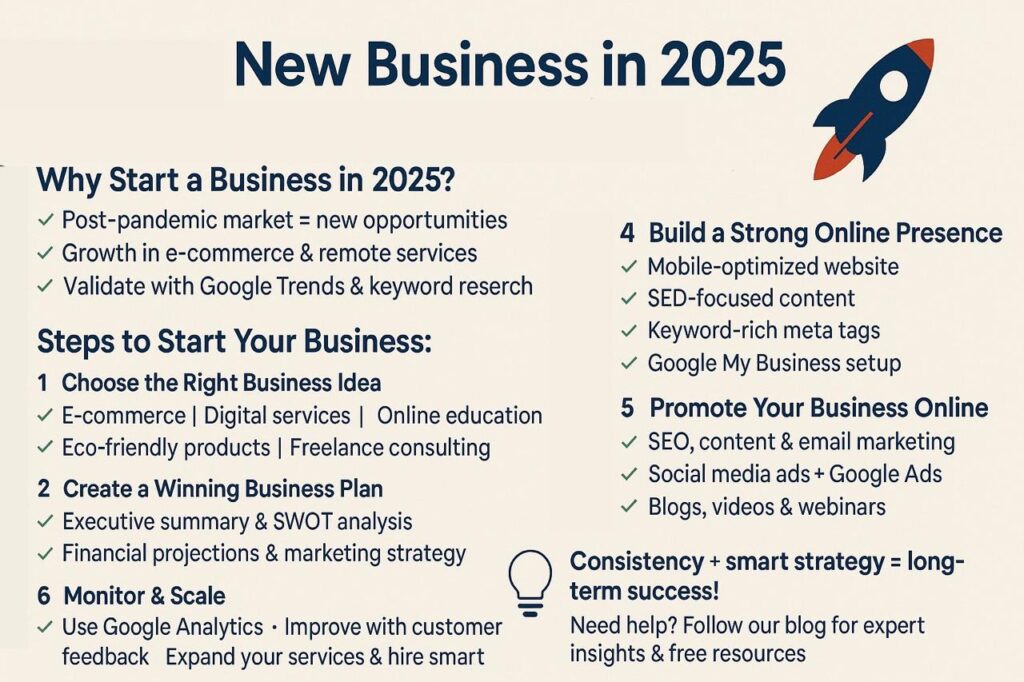
Launching a new business in 2025 can be one of the most rewarding decisions of your life. Whether you're exploring startup business ideas, diving into entrepreneurship, or turning a passion into a profession, the journey begins with clarity, planning, and strategy. This article offers essential tips for starting and growing your small business, with powerful insights and on-page SEO optimization to help your website stand out online.
Why Start a New Business Now?
The post-pandemic economy has created countless opportunities for new business ideas. With the rapid rise of e-commerce, digital marketing, and remote services, there’s never been a better time to explore the entrepreneurial path. Starting your own business can lead to financial freedom, personal satisfaction, and long-term success if done strategically.
Step 1: Choose the Right Business Idea
Your success begins with a solid business concept. Look for new business ideas that align with your skills, interests, and market demand. Popular niches in 2025 include:
- E-commerce stores (fashion, tech gadgets, handmade items)
- Digital services (graphic design, SEO, copywriting)
- Online education platforms
- Green businesses (eco-friendly products)
- Freelance consulting
Research your competition, analyze trends, and validate your idea before investing. Use tools like Google Trends and keyword research platforms to understand what customers are searching for.
Step 2: Create a Business Plan
A solid business plan is the foundation of your new business. It not only guides your actions but also helps attract investors, lenders, and partners.
✅ What to Include in Your Business Plan:
- Executive Summary
A quick overview of your business idea, goals, and what makes your business unique. - Business Overview
Describe your business model, legal structure, and stage of development (idea, prototype, or launch-ready). - Mission & Vision
- Mission: What your business aims to achieve today.
- Vision: Where you want your business to be in the next 3–5 years.
- Target Market & Competition
Define your ideal customers and analyze competitors. Include a brief SWOT analysis to highlight your strengths and areas to improve. - Product or Service Details
Clearly explain what you're offering, how it solves a problem, and why it’s valuable. - Marketing Strategy
Outline how you'll reach your audience—via SEO, social media, paid ads, or influencer marketing. - Financial Plan (Basic)
Estimate startup costs, expected income, and expenses. You don’t need full projections yet, but a rough plan will help guide you.
Include the following in your plan:
- Executive summary
- Business description
- SWOT analysis (Strengths, Weaknesses, Opportunities, Threats)
- Financial projections
- Marketing and sales strategies
Step 3: Register Your Business Legally
Choose a business structure that fits your needs—sole proprietorship, partnership, LLC, or corporation. Register your business name, get the necessary licenses, and obtain your tax ID number. This step builds credibility and ensures your new business complies with local regulations.
Step 4: Build a Strong Online Presence
In 2025, having a digital footprint is non-negotiable. Start by creating a professional website optimized for on-page SEO. Use power keywords like:
- how to start a business
- small business tips
- startup marketing strategies
- new business opportunities
Ensure your website includes:
- Mobile-friendly design
- Fast loading speed
- Clear call-to-action (CTA)
- Keyword-optimized content and meta descriptions
- Google My Business listing
Step 5: Promote Your Business Strategically
Focus on digital marketing to grow your visibility. Utilize:
- Social media marketing (Facebook, Instagram, LinkedIn)
- Email marketing to build client relationships
- Search engine optimization (SEO) to rank your website
- Paid ads (Google Ads, social media ads) for targeted reach
- Content marketing through blogs, videos, and webinars
The right mix of online strategies can help you attract potential customers and build a loyal brand following.
Step 6: Monitor, Scale, and Grow
Success doesn’t come overnight. Monitor your business performance using tools like Google Analytics, customer feedback, and sales data. Adapt your strategy based on what's working. As your new business grows, consider:
- Hiring a team
- Expanding your product/service line
- Investing in branding
- Exploring new markets
Continuous improvement is key to sustainable business growth.
Final Thoughts
Starting a new business can be both challenging and exciting. With the right mindset, tools, and strategy, you can transform your idea into a thriving venture. Follow these small business tips, stay consistent, and always keep learning. Remember, success in entrepreneurship is a journey—so start strong, stay focused, and grow smart.
For more business resources, strategies, and expert advice, stay tuned to our blog!

